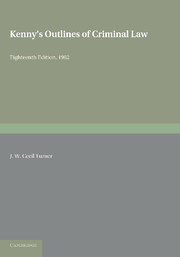Book contents
- Frontmatter
- Preface to the Sixteenth Edition
- Preface to The Seventeenth Edition
- Preface to the Eighteenth Edition
- Contents
- Index of cases
- Index to the principal statutes
- List of principal books cited
- BOOK I GENERAL CONSIDERATIONS
- CHAPTER I CRIME AND CRIMINAL LAW
- CHAPTER II PRINCIPLES OF CRIMINAL LIABILITY
- CHAPTER III VARIATIONS IN LIABILITY
- CHAPTER IV PRELIMINARY CRIMES
- CHAPTER V THE POSSIBLE PARTIES TO A CRIME
- CHAPTER VI THE CLASSIFICATION OF CRIMES
- BOOK II DEFINITIONS OF PARTICULAR CRIMES
- BOOK III MODES OF JUDICIAL PROOF
- BOOK IV CRIMINAL PROCEDURE
- Appendix I The meaning of ‘credit’
- Appendix II II Rules as to admission of evidence which reveals to the jury facts discreditable to the person accused
- Appendix III III Forms of indictment
- Index
CHAPTER VI - THE CLASSIFICATION OF CRIMES
from BOOK I - GENERAL CONSIDERATIONS
Published online by Cambridge University Press: 05 June 2016
- Frontmatter
- Preface to the Sixteenth Edition
- Preface to The Seventeenth Edition
- Preface to the Eighteenth Edition
- Contents
- Index of cases
- Index to the principal statutes
- List of principal books cited
- BOOK I GENERAL CONSIDERATIONS
- CHAPTER I CRIME AND CRIMINAL LAW
- CHAPTER II PRINCIPLES OF CRIMINAL LIABILITY
- CHAPTER III VARIATIONS IN LIABILITY
- CHAPTER IV PRELIMINARY CRIMES
- CHAPTER V THE POSSIBLE PARTIES TO A CRIME
- CHAPTER VI THE CLASSIFICATION OF CRIMES
- BOOK II DEFINITIONS OF PARTICULAR CRIMES
- BOOK III MODES OF JUDICIAL PROOF
- BOOK IV CRIMINAL PROCEDURE
- Appendix I The meaning of ‘credit’
- Appendix II II Rules as to admission of evidence which reveals to the jury facts discreditable to the person accused
- Appendix III III Forms of indictment
- Index
Summary
Section I. Indictable and Petty Offences
Public wrongs, pleas of the crown, or—to use a word more familiar but more ambiguous—crimes, may be arranged, according to their technical degrees of importance, in the following groups.
(a) Indictable offences, i.e. those which admit of trial by jury:
(i) treasons,
(ii) (other) felonies,
(iii) misdemeanours.
(b) Petty offences, i.e. those which can only be tried summarily, by justices of the peace sitting without a jury.
The word ‘crime’ is properly applicable to all these; and thus, for instance, in the Judicature Acts the expression ‘criminal cause or matter’ includes them all. But sometimes more restricted senses have been adopted: as when Serjeant Stephen, in rewriting Blackstone's Commentaries, limited crime to ‘offences that are indictable’ or when Blackstone himself went still further, and limited it to indictable offences that are graver than misdemeanours.
The two groups, indictable and non-indictable, were originally quite exclusive of each other; but now they overlap to some extent. For, under the Magistrates' Courts Act, 1952, sections 19 and 20, some common indictable offences may under certain circumstances be tried summarily instead, whilst all such of the petty offences as are heinous enough to admit of a sentence of imprisonment for over three months may instead be tried on indictment.
HISTORICAL
The discussion of the distinction between indictable and non-indictable offences may conveniently be postponed until we reach the subject of procedure. But the mode in which indictable offences themselves are subdivided springs from so noteworthy a historical origin, and produces so many important consequences, as to deserve immediate consideration.
Amongst indictable crimes, the common law singled out some as being so conspicuously heinous that a man adjudged guilty of any of them incurred—not as any express part of his sentence but as a consequence that necessarily ensued upon it—a forfeiture of property, whether of his lands or of his goods or of both (in the case of treason). Such crimes came to be called ‘felonies’. The other, and lesser, crimes were known as ‘transgressions’ or ‘trespasses’, and did not obtain their present name of misdemeanours until a much later date.
- Type
- Chapter
- Information
- Kenny's Outlines of Criminal Law , pp. 116 - 124Publisher: Cambridge University PressPrint publication year: 2013



